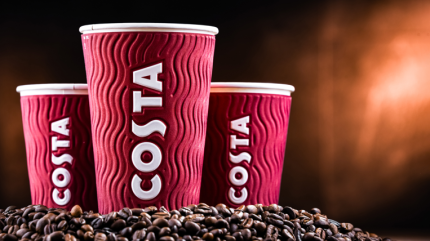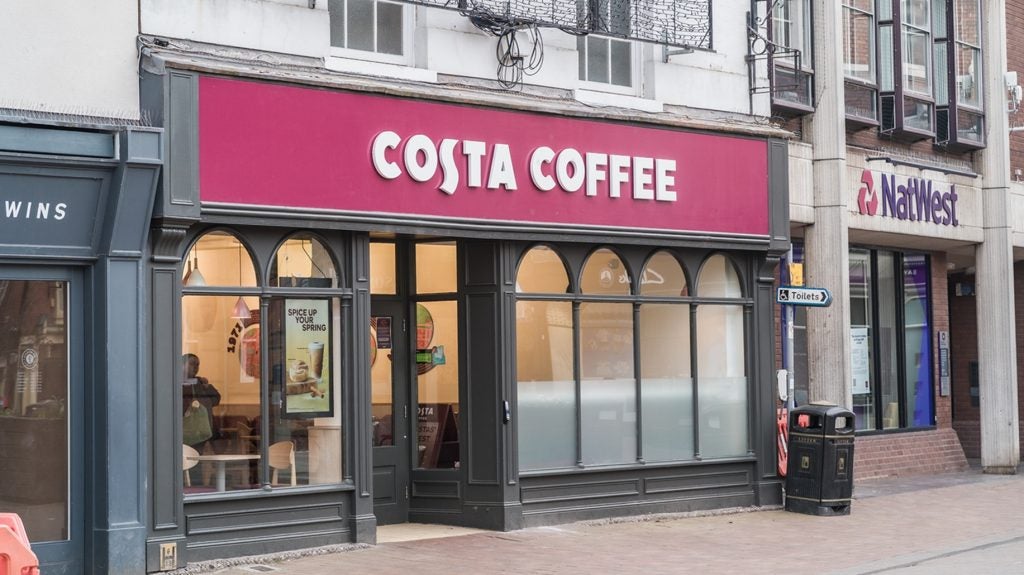
When Coca-Cola snapped up Costa Coffee for £3.9bn ($5.2bn) in 2018, the move was hailed as a bold new step into the booming hot drinks market.
But, seven years on, Coca-Cola is reportedly weighing up a sale of the UK’s biggest coffee-shop chain – a potential shift that raises questions about whether the bet ever really paid off.
Last month, Sky News reported Coca-Cola had appointed Lazard, the investment bank, to review its options for Costa Coffee, which operates in around 50 countries worldwide.
Originally bought to reduce Coca-Cola’s reliance on sugary soft drinks, the UK broadcaster revealed indicative orders for Costa Coffee could be made in the autumn.
Coca-Cola “reflecting” on Costa
Coca-Cola doesn’t disclose detailed financial numbers on Costa. Up to the start of this year, Costa was housed in the group’s Global Ventures unit, alongside UK soft-drinks business Innocent and Turkish herbal tea brand Doğadan. From the start of the year, Costa’s results have been reported to Coca-Cola’s Europe, Middle East and Africa operating segment.
Speaking to analysts in July after Coca-Cola reported its second-quarter financial results, CEO James Quincey was asked to reflect on the coffee market and the company’s strategy in the sector.

US Tariffs are shifting - will you react or anticipate?
Don’t let policy changes catch you off guard. Stay proactive with real-time data and expert analysis.
By GlobalDataHe said: “Coffee is a large, fragmented, growing category in the total beverage industry, so, it’s clearly attractive if we and the bottling system can find ways to participate more deeply in that category.
“Now, having said that, our investment in Costa is not where we wanted it to be from an investment hypothesis point of view.
“The business is still a good business, but it’s not quite delivered on the different verticals of growth that we were hoping to accelerate much quicker, the ready-to-drink coffee, the Express machines at home.”
There are more than 2,000 Costa Coffee stores in the UK and over 3,000 globally. Quincey said the Costa business “remains more weighted to stores”.
He said: “In the stores, we’ve been driving the affordability and actually doing a good job on refreshing the stores and driving the speed of service.”
However, the Coca-Cola chief added: “Still, the investment hypothesis as originally intended has not played out despite the improvement in the store
business I think I would say we’re in the mode of reflecting on what we’ve learnt, thinking about how we might want to find new avenues to grow in the coffee category, while continuing to run the Costa business successfully because it’s still a lot of money we put down and we want that money to work as hard as possible.”
Why Costa hasn’t delivered
Reading those comments in the wake of the Sky News report and Coca-Cola’s reported appointment of Lazard, it seems those reflections may now include the future ownership of the business.
One analyst told Sky News a sale could fetch £2bn, almost half what Coca-Cola paid in 2018.
Nevertheless, there is a feeling among some industry watchers the company should offload the business.
“From a food and retail perspective, this looks like the right move”, Louis Bedwell, business unit lead for UK consultancy Future Food Movement, says. “Costa is a well-established consumer brand but it has never truly fitted within Coca-Cola’s operating model.
“Coca-Cola is built for beverages, with global scale, distribution and brand equity in bottles and cans. Costa is a retail and hospitality business built around property, labour and direct-to-consumer service.”
Bedwell believes selling Costa Coffee “allows each business to focus on what it does best.”
He continues: “Costa has held its ground but has not unlocked new growth. Coca-Cola has extended the brand into vending and ready-to-drink formats, which play to its strengths but the UK store estate has faced the same structural pressures as the wider high street: rising costs, tight labour markets and changing consumer habits.”

In its most recent full-year filings from 2023, the coffee chain recorded revenues of £1.22bn, which represented a 9% increase over 2022 but was below the £1.3bn recorded in the 12 months to 1 March 2018 – the last year before Coca-Cola took control of the business.
Furthermore, Costa’s 2023 accounts referred to “inflationary pressures on the cost of goods,” including energy and payroll, and “the impairment of the company’s investments in two of its subsidiaries”, which resulted in an overall loss of just under £14m for the year.
A sale would not be just a retreat, it’s more like portfolio discipline
Ivan Torossian
Ivan Torossian, a consulting director at GlobalData, Just Drinks‘ parent, says: “Costa has underdelivered compared to Coca-Cola’s original ‘total beverage’ vision and it remains operationally heavy for Coke’s asset-light philosophy.
“If Coca-Cola moves forward with the sale, it would free focus and capital for higher-velocity brands and/or adjacencies – think sparkling, hydration, energy, RTD coffee/tea, alcohol adjacencies – while leaving coffee retail to specialists.”
Torossian adds a sale “would not be just a retreat; it’s more like portfolio discipline.”
He adds: “Costa’s retail estate is an operational anomaly in Coke’s portfolio. Stores demand a foodservice operator’s mindset (real estate, labour, foodservice economics). However, Coca-Cola’s strengths are in brand building and distribution/supply chain scale.”
Coca-Cola could keep a foot in coffee
A sale of the Costa Coffee wouldn’t mean Coca-Cola exits coffee completely. It also owns the Georgia Coffee packaged-coffee brand, for example.
Moreover, industry watchers believe Coca-Cola could keep an interest in the Costa brand through RTD products.
“By moving away from the coffee-shop model but retaining RTD formats, Coke can still capture coffee consumption occasions without the profit and loss distraction of a chain that doesn’t fit its DNA,” Torossian says.
“I think Coke should try to keep high-margin, scalable-coffee formats (RTD Costa, partnerships via bottlers, Express machines under licensing/franchising) and exit the capital and labour-intensive retail shops,” he says. “That would keep coffee presence where Coke has advantage, such as route-to-market, cooler density, vending, while removing the operational complexity.”
Bedwell adds: “Coca-Cola needs to prioritise where it creates the most value and that is not high street retail.
“The pressures it faces are already significant: consumers shifting towards healthier options, squeezed margins and trust becoming the key battleground. Costa does not strengthen Coca-Cola against those challenges.
“Trust and value are earned differently in beverages compared to retail. Costa needs an owner who can invest in formats, supply chains and hospitality experience, while Coca-Cola should focus on its unique strengths.”
Who could buy Costa Coffee?
Last month, Sky News reported initial talks had already taken place with a small number of potential bidders, including private-equity firms. Names including Apollo Global Management and TDR Capital – the owner of UK grocer Asda – have emerged in recent days.
Michel Acda, a partner at European food and drinks consultancy Food Strategy Associates, suggests one possible suitor that has yet to be formally created.
Last month, Keurig Dr Pepper’s struck a deal to acquire Dutch coffee company JDE Peet’s and then split the combined business into two.
Keurig Dr Pepper subsequently plans to separate the enlarged entity into two publicly traded entities named Beverage Co. and Global Coffee Co. “as soon as practicable following the close of the acquisition”.
Acda wonders if the new Global Coffee Co. could be a contender to buy Costa.
“I think in terms of change and dynamics, the question is: is that way too early or not for sure?” Acda says
“It is an interesting hypothesis to chew on and to see whether that could be a logical route in in terms of being part of a pure-play space and just adding another channel and another brand to the house of brands that JDE Peet’s has.”
Bedwell says he can’t comment on potential specific buyers but he thinks three types of owners make sense: “A global operator experienced in scaling food and coffee retail, a UK retailer wanting to drive footfall and brand presence through coffee and food-to-go, or private capital with an eye on optimising the estate and positioning Costa for future growth.”
Torossian adds: “I heard they are in talks with a restaurant investment group already, but I wouldn’t rule out a PE group with expertise in foodservice. Maybe RBI [Restaurant Brands International] or Jollibee, considering coffee retail expertise, but overlaps make this less likely in the UK.”
While Coca-Cola isn’t commenting directly on the future of Costa, it’s clear that, seven years after a deal that gave the market a jolt, the company is mulling over its position in coffee.



